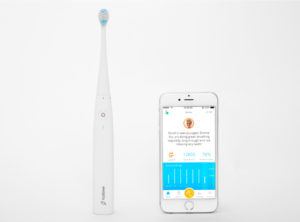Artificial Intelligence gets smart at CES 2017
 Las Vegas, January 2017 — “Alexa, secure the enterprise against ransomware.” Artificial intelligence is making tremendous headway, as seen at this year’s huge Consumer Electronics Show (CES). We’re seeing advances that leverage AI in everything from speech recognition to the Internet of Things (IoT) to robotics to home entertainment.
Las Vegas, January 2017 — “Alexa, secure the enterprise against ransomware.” Artificial intelligence is making tremendous headway, as seen at this year’s huge Consumer Electronics Show (CES). We’re seeing advances that leverage AI in everything from speech recognition to the Internet of Things (IoT) to robotics to home entertainment.
Not sure what type of music to play? Don’t worry, the AI engine in your cloud-based music service knows your taste better than you do. Want to read a book whilst driving to the office? Self-driving cars are here today in limited applications, and we’ll see a lot more of them in 2017.
Want to make brushing your teeth more fun, all while promoting good dental health? The Ara is the “1st toothbrush with Artificial Intelligence,” claims Kolibree, a French company that introduced the product at CES 2017.
Gadgets dominate CES. While crowds are lining up to see the AI-powered televisions, cookers and robots, the real power of AI is hidden, behind the scenes, and not part of the consumer context. Unknown to happy shoppers exploring AI-based barbecues, artificial intelligence is keeping our networks safe, detecting ransomware, helping improve the efficiency of advertising and marketing, streamlining business efficiencies, diagnosing telecommunication faults in undersea cables, detecting fraud in banking and stock-marketing transactions, and even helping doctors track the spread of infectious diseases.
Medical applications capture the popular imagination because they’re so fast and effective. The IBM Watson AI-enabled supercomputer, for example, can read 200 million pages of text in three seconds — and understand what it reads. An oncology application running on Watson analyzes a patient’s medical records, and then combines attributes from the patient’s file with clinical expertise, external research, and data. Based on that information, Watson for Oncology identifies potential treatment plans for a patient. This means doctors can consider the treatment options provided by Watson when making decisions for individual patients. Watson even offers supporting evidence in the form of administration information, as well as warnings and toxicities for each drug.
Doctor AI Can Cure Cybersecurity Ills
Moving beyond medicine, AI is proving essential for protecting computer networks — and their users against intrusion. The traditional non-AI-based anti-virus and anti-malware products can’t protect against advanced threats, and that’s where companies like Cylance come in. They can use neural networks and other machine-learning techniques to study millions of malicious files, from executables to documents to PDFs to images. Using pattern recognition, Cylance have developed a revolutionary machine learning platform that can identify suspicious files that might be seen on websites or as email attachments, even if it’s never seen that particular type of malware before. Nothing but AI can get the job done, not in an era when over a million new pieces of malware, ranging from phishing to ransomware, appear every single day.
Menlo Security is another network-protection company that leverages artificial intelligence. The Menlo Security Isolation Platform uses AI to prevent Internet-based malware from ever reaching an endpoint, such as a desktop or mobile device, because email and websites are accessed inside the cloud — not on the client’s computer. Only safe, malware-free rendering information is sent to the user’s endpoint, eliminating the possibility of malware reaching the user’s device. An artificial intelligence engine constantly scans the Internet session to provide protection against spear-phishing and other email attacks.
What if a machine does become compromised? It’s unlikely, but it can happen — and the price of a single breech can be incredible, especially if a hacker can take full control of the compromised device and use it to attack other assets within the enterprise, such as servers, routers or executives’ computers. If a breach does occur, that’s when the AI technology of Javelin Networks leaps into action, detecting that the attack is in progress, alerting security teams, isolating the device from the network — while simultaneously tricking the attackers into believing they’ve succeeded in their attack, therefore keeping them “on the line” while real-time forensics gather information needed to identify the attacker and help shut them down for good.
Socializing Artificial Intelligence
There’s a lot more to enterprise-scale AI than medicine and computer security, of course. QSocialNow, an incredibly innovative company in Argentina, uses AI-based Big Data and Predictive Analytics to watch an organization’s social media account — and empower them to not only analyze trends, but respond in mere seconds in the case of an unexpected event, such as a rise in customer complaints, the emergence of a social protest, even a physical disaster like an earthquake or tornado. Yes, humans can watch Twitter, Facebook and other networks, but they can’t act as fast as AI — or spot subtle trends that only advanced machine learning can observe through mathematics.
Robots can be powerful helpers for humanity, and AI-based toothbrushes can help us and our kids keep our teeth healthy. While the jury may be out on the implications of self-driving cars on our city streets, there’s no doubt that AI is keeping us — and our businesses — safe and secure. Let’s celebrate the consumer devices unveiled at CES, and the artificial intelligence working behind the scenes, far from the Las Vegas Strip, for our own benefit.



